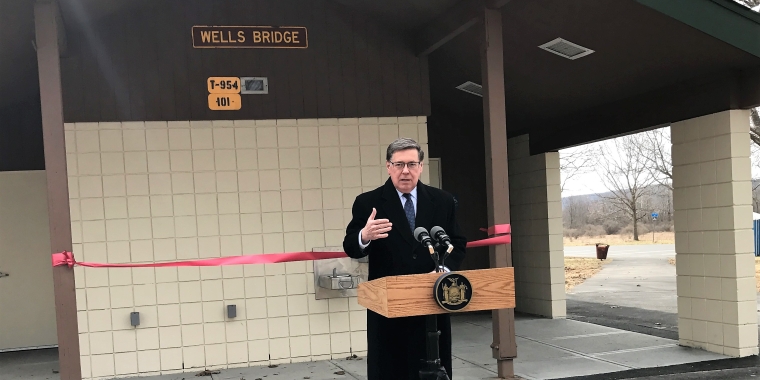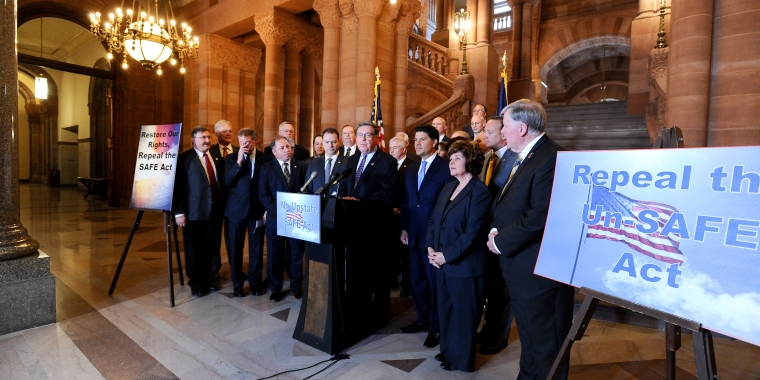
Protecting Victims Of Domestic Violence
James L. Seward
During the recent flap over Gov. Spitzer's plan to issue drivers' licenses to illegal aliens, the question arose as to what benefits an illegal alien in New York can receive. Here is a quick look at what New York State grants to illegal immigrants.
Conservation. Nonresidents of the state can purchase fishing and sporting licenses with any photo ID (including a passport from another country), and those who want to hunt must add in proof of having hunted before (such as a license from another state or evidence of having taken a hunter education course). According to the Office of Parks, Recreation and Historic Preservation, a valid address is the only requirement to purchase an Empire Passport, which allows unlimited access to New York State Parks.
Given these requirements, it is possible for illegal aliens to obtain legal hunting and fishing privileges in New York State, as well as access to all state parks.
Education. As a result of a 1982 Supreme Court decision, states are required to provide K-12 public education for students without legal immigrant status. New York State is in compliance with this decision. SUNY tuition policy states that undocumented aliens who attend New York high schools for at least 2 years and graduate from them may be eligible for the in-state tuition rate. However, illegal immigrants are ineligible for the tuition assistance program (TAP).
Health. Proof of citizenship is required to qualify for Medicaid, unless a woman is pregnant, or the situation is considered an "emergency." New York State law requires that hospitals treat everyone who requires emergency care. "Continuing" care, by federal definition, is not included.
Labor. Believe it or not, illegal immigrants are eligible for workers' compensation, but not unemployment insurance. Labor standards laws also still apply to illegal aliens, such as the minimum wage, hours of labor or prevailing wage on public construction projects.
Mental Hygiene. Hospitals have a responsibility to treat patients with emergency medical conditions, including mental illnesses.
Welfare. Whether illegal aliens can obtain state benefits is not clear-cut. The short answer appears to be that they are not legally entitled to most benefits, but do in fact receive them.
Under federal law, any alien who is not a "qualified" alien is ineligible for state and local public benefits. To be qualified one has to be here under asylum, admitted for permanent residence, or fit another limited federal category.
Federal rules generally bar illegal aliens from participation in state and local public benefit programs, unless the benefit is for the treatment of an emergency medical condition, is short-term, non-cash, in-kind emergency disaster relief or immunization.
New York also has a similar regulation under its rules that govern eligibility for the receipt of Temporary Assistance for Needy Families (TANF). Lawful residence in the United States, if the recipient is an alien, is among seven factors that affect eligibility.
A fair interpretation of the federal statute and state regulation must result in the conclusion that illegal aliens should not receive any form of state public assistance. However, illegal aliens do, in fact, receive state public benefits. That's because the burden of determining lawful status in the U.S. is on the shoulders of county social services employees who have neither the legal jurisdiction nor the practical ability to determine one's immigration status. Only an immigration official or federal worker whom the Secretary of Homeland Security has authorized may determine the immigration status of a person in the country.
Typically, any proof an illegal alien provides as evidence of legal status, regardless of its fraudulent nature, will satisfy social services agencies that determine the person's benefit eligibility because an intake clerk simply cannot make the determination that someone is an illegal alien. Therefore, the law is usually overlooked and illegal aliens manage to qualify for state and local benefits.
Domestic violence, also known as family violence and spousal abuse, is a serious issue that jeopardizes the safety of millions of Americans. Women ages 15 to 44 are overwhelmingly the victims of domestic violence, accounting for about 30 percent of all emergency room visits by women in the U.S. This may be in part because men tend to under-report incidents of violence against themselves because of the social stigma associated with being male and a victim of spousal abuse.
The American Medical Association has estimated that 1 in 4 women is likely to be abused in her lifetime, and that females are victims of family violence at a rate at least 3 times that of males.
According to the state's William B. Hoyt Memorial Children and Family Trust Fund, women are more likely to be assaulted, injured, raped, or killed by a husband or boyfriend than by a stranger. In New York State, the vast majority of domestic violence offenses typically consist of offenses against women by their husbands or live-in boyfriends. For years, police agencies were hesitant to respond to reports of domestic violence, since such incidents were thought of as private marital squabbles, not crimes.
However, studies have shown the value of police intervention and arrest in domestic violence cases. Many states now have enacted legislation requiring arrest in cases of probable domestic assault.
Declaring that domestic violence is criminal conduct occurring between members of the same family or household which warrants stronger intervention, the state legislature enacted the Family Protection and Domestic Violence Intervention Act in 1994. The act strengthened state laws by providing for immediate deterrents by law enforcement officials and the judiciary, increasing penalties for violence within the household, and integrating the purposes of the family and criminal laws to ensure clear and certain standards of protection for New York State families (Chapters 222 and 224, L. 1994). In 2005, the sunset date of the mandatory arrest provision of the act was extended.
In our special senate session in October the state senate passed legislation (S.4875) that would provide victims of domestic violence greater protection by allowing them to testify in court via closed-circuit television.
Violent abusers can terrify and intimidate their victims during court proceedings. To break the cycle of abuse, victims should be in non-threatening environments when giving testimony. They shouldn’t be stared down by people who have physically and emotionally tortured them. Closed circuit testimony will help ensure that justice will be served.
The Senate Majority Task Force on Critical Choices is taking an aggressive approach to safeguard all New Yorkers from violence. We have advanced an aggressive criminal justice agenda this year, including cracking down on Internet predators; locating criminals who are missing from the sex offender registry; ensuring student safety on school buses; and raising penalties for thugs who attack senior citizens. The senate has taken another step with the domestic violence bill which will keep women who have already suffered so much from becoming victims again in the courtroom.
The bill was announced earlier this year at a Capitol news conference, in observance of National Crime Victims’ Rights Week, where members of the senate majority were joined by Mrs. New York State 2007 Lori Donaudy of Smithtown, Long Island. A former victim of domestic abuse, Lori’s platform as Mrs. New York includes raising awareness of domestic violence, supporting victims, and raising funds for Joe Torre’s Safe at Home Foundation.
Over two-thirds of domestic violence crimes against women are committed by someone known to them. Very often, vulnerable witnesses are reluctant to testify about crimes that have been committed against them out of fear. Allowing witnesses to testify via closed-circuit television may help their willingness to come forward and testify.
The bill was sent to the assembly.
Share this Article or Press Release
Newsroom
Go to NewsroomStatement on Senate Budget
March 15, 2017

Reopened Rest Areas Enhance Safety for I-88 Travelers
March 9, 2017


